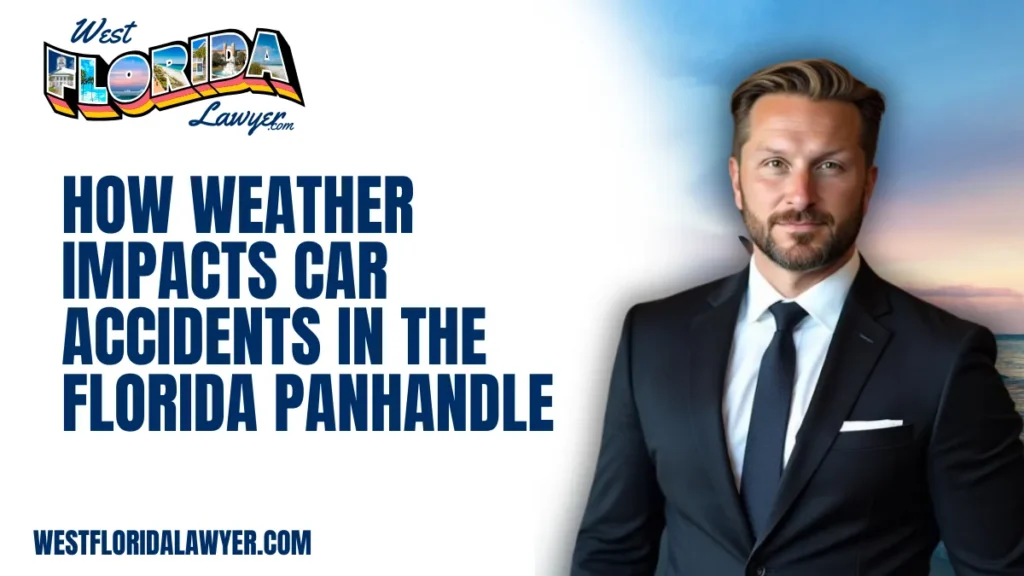
Weather-related car accidents Florida are a significant concern in the Florida Panhandle, where fluctuating weather conditions can dramatically affect road safety. At West Florida Lawyer, we have seen firsthand how unpredictable weather patterns increase the likelihood of collisions, injuries, and fatalities.
Complete our free case evaluation form today and let’s talk about how we can help.
The Link Between Weather and Vehicle Crashes in Florida
When it comes to weather-related car accidents Florida, data shows that inclement weather plays a significant role in crash statistics. Rain, fog, hurricanes, tropical storms, and even sudden cold snaps are frequent in the Panhandle and contribute to poor visibility, slippery roads, and driver panic.
According to the Federal Highway Administration, nearly 21% of all motor vehicle crashes in the United States are weather-related. In Florida, these incidents often involve hydroplaning, rear-end collisions, loss of vehicle control, and failure to stop in time due to wet or slick road surfaces.
Heavy Rain and Hydroplaning Hazards in the Panhandle
Rainfall is the leading cause of weather-related car accidents Florida. The Florida Panhandle, with its subtropical climate, experiences high volumes of rain, especially during hurricane season.
Hydroplaning is a common danger during heavy rain. This occurs when a layer of water builds up between the vehicle’s tires and the road surface, leading to a loss of traction. Drivers often underestimate the risk of hydroplaning at speeds as low as 35 mph on wet roads. The result can be devastating: spinouts, collisions, or vehicles veering off the road entirely.
Moreover, the initial minutes of rainfall are particularly dangerous. Oil residue on roads mixes with rainwater, creating a slick surface that significantly increases stopping distances.
Fog: The Invisible Danger
Fog is another factor behind weather-related car accidents Florida, particularly in the early morning hours. The Panhandle’s proximity to the Gulf of Mexico results in frequent fog formation, especially in low-lying or coastal areas.
Reduced visibility caused by fog leads to a higher risk of multi-vehicle pileups. Drivers may fail to see stopped vehicles, pedestrians, or obstacles in time to react safely. While fog-related crashes are often less frequent than rain-related ones, they tend to result in more severe injuries due to high-speed impacts.

Tropical Storms and Hurricanes: Widespread Impact on Road Safety
The Atlantic hurricane season spans from June through November, during which the Florida Panhandle is highly vulnerable to tropical systems. These intense weather events bring not only torrential rain but also hurricane-force winds, flooding, and debris-strewn roads.
Weather-related car accidents Florida increase dramatically during and immediately after hurricanes. Poorly maintained infrastructure can collapse or flood, streetlights may fail, and fallen trees or power lines may block visibility and access. Moreover, panicked evacuations often result in gridlock and high-speed collisions.
After hurricanes, roads may remain hazardous for days due to continued flooding and downed traffic signals, posing ongoing risks for motorists.
Sudden Cold Snaps and Icy Conditions
While less common than in northern states, the Florida Panhandle can experience overnight freezing temperatures in winter months. When that happens, black ice can form on bridges and overpasses—especially in rural areas—without drivers noticing until it’s too late.
Icy conditions are deceptive. A road may appear dry, but invisible patches of ice can cause sudden skids or loss of control. Inexperienced drivers, unaccustomed to these conditions, may panic or overcorrect, compounding the risk.
Wind and Debris: Underestimated Road Hazards
High winds, whether from storms or strong coastal gusts, are often underestimated by drivers. In the Florida Panhandle, sudden gusts can blow vehicles out of lanes, especially high-profile ones like SUVs or trucks. Flying debris, such as palm fronds or construction materials, can strike windshields or obstruct the roadway, contributing to weather-related car accidents Florida.
Why the Florida Panhandle Is Especially Vulnerable
The Florida Panhandle’s unique geography makes it more vulnerable to weather-related car accidents Florida than many other parts of the state. Factors contributing to this include:
- Coastal terrain leading to higher fog and humidity.
- Frequent thunderstorms and tropical activity during the summer and fall.
- Less developed rural infrastructure, including unlit roads and fewer barriers.
- Tourism traffic, with many out-of-state drivers unfamiliar with local weather patterns.
Who Is Liable in Weather-Related Car Accidents?
At West Florida Lawyer, we understand that weather may be a contributing factor, but it rarely removes liability. A driver who fails to adjust speed or maintain proper distance during adverse weather can still be held accountable for injuries and damages.
Common forms of negligence in weather-related car accidents Florida include:
- Speeding in rain or fog.
- Failure to use headlights.
- Ignoring weather advisories.
- Driving on worn tires with poor traction.
- Distracted or impaired driving.
If you or a loved one were injured in a car accident due to another driver’s negligence during adverse weather, you may be entitled to compensation. We conduct detailed investigations, secure accident reconstructions, and work with meteorological experts to prove liability in weather-related crashes.
What to Do After a Weather-Related Crash
If you’re involved in a weather-related accident in the Florida Panhandle, follow these steps:
- Ensure safety first – move to a safe location and check for injuries.
- Call 911 – report the accident and request emergency services if needed.
- Document the scene – take photos or videos showing road conditions, weather, and vehicle damage.
- Exchange information – get the other driver’s contact and insurance details.
- Seek medical attention – even if injuries appear minor.
- Contact an attorney – speak with West Florida Lawyer as soon as possible.
Our legal team can help you navigate insurance claims and build a strong case for recovery.
The Role of Driver Education in Preventing Weather-Related Accidents
In addition to the natural challenges posed by Florida’s weather, driver education plays a crucial role in preventing weather-related car accidents Florida. Many accidents could be avoided if drivers were better educated on how to handle hazardous weather conditions, whether it’s driving through fog, heavy rain, or even navigating icy roads during rare cold spells.
Education on Weather-Related Hazards
Most drivers are taught basic skills for clear, dry roads, but they often lack proper training on how to adjust their driving habits in adverse weather conditions. Drivers need to understand the dangers of hydroplaning, the importance of maintaining a safe distance during foggy conditions, and how to handle the vehicle during gusty winds or flooding.
State programs and private organizations have started offering more advanced driver safety courses, which include modules on handling vehicles in bad weather. These programs often focus on crucial driving techniques such as:
- Reducing speed in rain and fog to allow for better stopping distances.
- Maintaining a safe following distance in slippery conditions to avoid rear-end collisions.
- Proper tire maintenance, such as checking tire tread depth, to reduce the risk of hydroplaning.
- Understanding weather alerts and knowing when to delay travel to avoid dangerous conditions.
How Better Driver Education Can Lower Accident Rates
When drivers are educated on the specific risks of weather-related crashes, they are more likely to make prudent decisions when conditions deteriorate. Knowledgeable drivers are not only less likely to engage in reckless behavior but are also more likely to take proactive steps, such as slowing down in adverse conditions or pulling off the road when visibility becomes dangerously poor.
As weather-related car accidents Florida continue to pose a threat, increased focus on driver education and awareness can help reduce crash rates, save lives, and ease the burden on local law enforcement and emergency responders. Ensuring that drivers are equipped with the tools to handle adverse weather conditions can make a significant difference in overall road safety.

Why Choose West Florida Lawyer for Your Case
We are proud to be a trusted legal advocate for victims of weather-related car accidents Florida. With years of experience handling personal injury cases in the Florida Panhandle, our team is dedicated to fighting for maximum compensation on your behalf. We offer personalized legal service, aggressive representation, and unwavering support throughout your recovery.
Don’t let an insurance company minimize your claim. Complete our free case evaluation form today and let us help you take the first step toward justice.
Sources
- Federal Highway Administration (FHWA) – Provides national statistics on weather-related vehicle crashes and safety recommendations.
https://ops.fhwa.dot.gov/weather/q1_roadimpact.htm - Florida Department of Transportation (FDOT) – State-level data and reports on traffic patterns and weather-related incidents.
https://www.fdot.gov - National Weather Service (NWS) – Real-time weather alerts and climate reports for the Florida Panhandle region.
https://www.weather.gov


